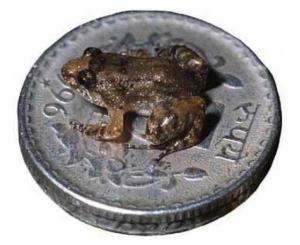Incredibly Tiny Frog Discovered
Posted by: Loren Coleman on October 4th, 2007

This newly discovered frog, full-grown, is only 0.3937 inches or 10 mm (or 1 cm) tiny, and is shown above sitting on an Indian 5 rupee coin.
Delhi University Systematics biologist S. D. Biju and his colleagues have found this new frog, India’s smallest land vertebrate, in the Western Ghats of Kerala, a mountainous region in the western portion of India.
The humid rainforests of the Western Ghats are the perfect habitat for these nocturnal frogs, which enjoy making mating calls from under leaf litter and among the roots of ferns during the monsoon months.
The common name for its genus is “Nightfrog,” and Biju has scientifically named the frog, Nyctibatrachus minimus.
Other extremely small frogs exist in various parts of the world, including Cuba, the Amazon and Borneo.
Biju has been searching in the Western Ghats to find new species of frogs for the past several years, and his discoveries include the purple frog (Nasikabatrachus) and the first canopy frog (Philautus nerostagona) from India.
Sources: University of Delhi, various Indian news outlets. ©Image courtesy of University of Delhi.
About Loren Coleman
Loren Coleman is one of the world’s leading cryptozoologists, some say “the” leading living cryptozoologist. Certainly, he is acknowledged as the current living American researcher and writer who has most popularized cryptozoology in the late 20th and early 21st centuries.
Starting his fieldwork and investigations in 1960, after traveling and trekking extensively in pursuit of cryptozoological mysteries, Coleman began writing to share his experiences in 1969. An honorary member of Ivan T. Sanderson’s Society for the Investigation of the Unexplained in the 1970s, Coleman has been bestowed with similar honorary memberships of the North Idaho College Cryptozoology Club in 1983, and in subsequent years, that of the British Columbia Scientific Cryptozoology Club, CryptoSafari International, and other international organizations. He was also a Life Member and Benefactor of the International Society of Cryptozoology (now-defunct).
Loren Coleman’s daily blog, as a member of the Cryptomundo Team, served as an ongoing avenue of communication for the ever-growing body of cryptozoo news from 2005 through 2013. He returned as an infrequent contributor beginning Halloween week of 2015.
Coleman is the founder in 2003, and current director of the International Cryptozoology Museum in Portland, Maine.










I can see that the frog is tiny, but that coin is from India–do we compare it to the dime or penny? That little guy is amazing!
It is reassuring that there are tiny frogs like this still being found. Frogs are extremely sensitive to changes in the environment or pollution and scientists often look to the native frogs and other amphibians to gauge the health of the ecosystem of the area. The sudden decline or die off of frogs in a habitat can mean that something is seriously wrong, and can be a precursor to what is coming. Amphibians in general are facing extinctions at an unusual rate throughout the world due to pollution, climate change and other negative environmental factors. The fact that these small frogs are there to be discovered is likely a good indication that this forest habitat is reasonably healthy.
Nifty! Thanks for letting us know about this, Loren! One more discovery that brings to mine one of my favorite quotes from Ambrose Bierce: “There is nothing new under the sun but there are lots of old things we don’t know.”
Wow! That frog is even smaller than the pygmy frog. Kool!
I’ve got a five-rupee coin right here with me (Wife from Bangalore) and it is slightly larger than our nickel.
That’s unfrog-ettable news! Toadily cool!
…Sorry, just a little jumpy today. Oh well that is good news, dont want the environment to degrade enough that these things croak.
Indeed mistery_man, those horrible mutations found on frogs that are the result of pesticides in the environment are a strong marker of the pollution levels in their ecosystem. We should consider our amphibian friends as the canary kept by the miners of the past. If they disappear entirely sooner or later we’ll be next.
We know now that the horrible mutations are due to a world-wide fungal infection attacking amphibians, not due to pesticides or other ways of blaming humans, though the initial assumption was that it just -had- to be us.
That frog is the same size as the toads that emerge from the tadpole stage all over the place around here. I guess that they must not grow once they finish the change? It just doesn’t seem incredibly small to me because the toads are so common.
hey loren very interesting article about tiny frogs. thanks bill green
Has anyone said ‘guy in a very small frog suit’ yet?
No?
Good.
It is always great to hear about new species being discovered!
Today in my pre-k classroom, the other teacher brought in a very tiny frog for the kids to look at for a few hours before we let it go. It is wonderful to think that they are the future for these new species and all the rest to come, I hope that I can help foster a respect for science and all related fields in them!